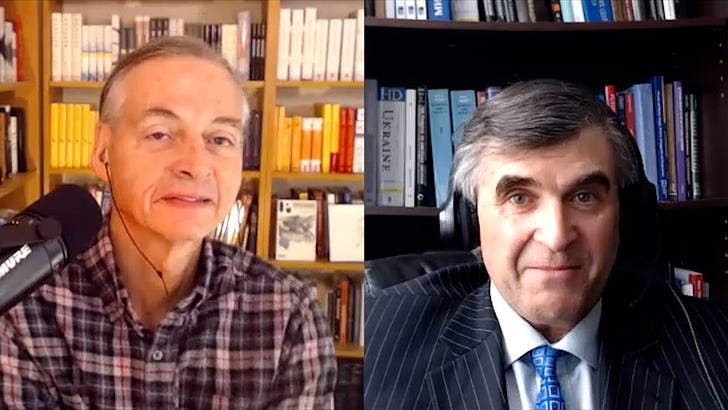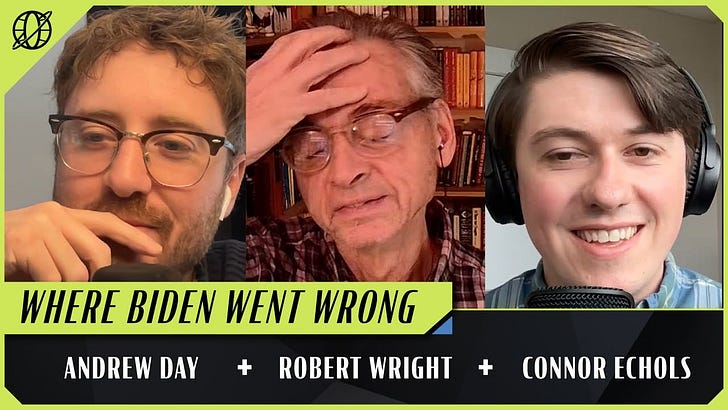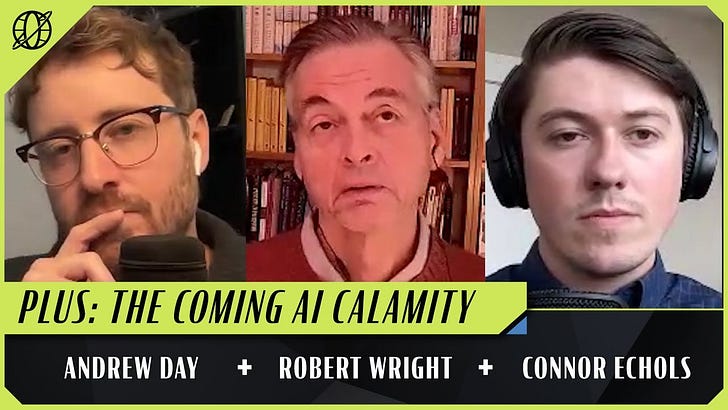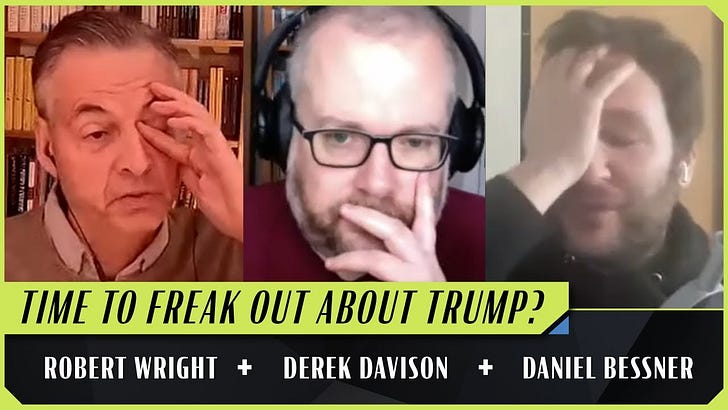This is an unusual issue of the newsletter, and it’s about an unusual conversation I taped yesterday. Normally I don’t send out an issue of NZN for each podcast I post, but I think this is a particularly important conversation—and also a complicated conversation, one that can benefit from a preface.
The conversation will go public next week and is available to paid NZN subscribers, like you, now—via this issue of the newsletter (video below, audio above) but also via the Nonzero feed on your podcast app (assuming you’ve set up the special paid subscriber version of that feed in your podcast app; if you haven’t, just click “Listen on” in the upper right corner of this post and follow the instructions).
The conversation is with Ivan Katchanovski, a political scientist who grew up in Ukraine, came to the US to do graduate work, and now teaches in Canada, at the University of Ottawa. He is frustrated with the way western media is covering the war in Ukraine and with the way western media depicts Ukraine more broadly—including the decade of turmoil that preceded the war.
One thing that impresses me about Katchanovski is his capacity for cognitive empathy. He grew up in western Ukraine, speaking Ukrainian, but he is attentive to perspectives in the eastern part of the country, where many people grew up speaking Russian and no few of them are considered “ethnically Russian”.
In fact, he has done research on the attitudes of eastern Ukrainians—which leads to one of his frustrations with western coverage of Ukraine. The standard western narrative about the path toward conflict in Ukraine depicts the pivotal events of 2014 roughly like this:
Peaceful protests against the policies of a pro-Russian president, Viktor Yanukovych, morphed into revolution—the “Maidan Revolution” or “Revolution of Dignity”—and after the president stepped down Putin responded by seizing Crimea and supporting separatists in the Donbas.
This is more or less accurate in so far as it goes. But Katchanovski would like to add a couple of things, the second of which would constitute a radical amendment to the standard narrative:
1. The Maidan revolution made the ground in eastern and southern Ukraine much more fertile for Russian intervention. The overthrow of a democratically elected president who had strong support in the Donbas and Crimea made many people in those areas more supportive of some kind of separation from the rest of Ukraine—more supportive of Russia’s annexation of Crimea and more supportive of the separatist movement in the Donbas that Putin would within months be aggressively aiding. (Katchanovski suggests that if the various Obama administration officials who were happy about the overthrow of Yanukovych had done their homework, they would have anticipated this effect on public opinion and perhaps been more ambivalent about regime change.)
2. The “Maidan massacre”—which is depicted in the standard narrative as the murder of dozens of protesters by riot police, and which put massive international pressure on Yanukovych to step down — wasn’t what it seemed. Katchanovski, after extensive research on how the revolution unfolded, has concluded that the massacre wasn’t in fact perpetrated by police, but rather by far right militants who supported the protests (but whom most of the protesters didn’t support, as most of the protesters weren’t far right). He says the snipers who killed the protesters were in buildings controlled by far right groups, not by the government.
In other words, Katchanovski contends that the killing of the protesters was a “false flag” operation—conducted in the hope that the Yanukovych regime would be blamed and would then be removed from power. Which is what happened.
I’m not conversant enough in the evidence to say whether Katchanovski is right, but one thing I can say is that he’s assembled a lot of evidence. You can find some of his writings on the subject here and here, and relevant videos he’s assembled here. (He says his most recent paper on the subject was accepted by an academic journal but then rejected, a change of heart he suspects reflects political pressure.)
I can also say that Katchanovski struck me as sincere and credible. But see what you think.
I should add that he has a strong accent, speaks fairly fast, and is not averse to the occasional tangent. But I think if you stick with the conversation until the end, your perspective on the war in Ukraine, and your understanding of Ukraine itself, will be significantly broadened.
00:00 Ivan’s Ukrainian upbringing and academic background
5:08 Where did pro-Russian sentiment in eastern Ukraine come from?
16:19 Why Ivan worried Ukraine’s 2014 revolution would lead to civil war
33:09 Did Europe impede resolution of Russia-Ukraine tensions?
49:25 What western media gets wrong about the Maidan revolution
59:49 Was the Maidan massacre a false flag operation?
1:15:29 The state of Ukrainian democracy after the Maidan revolution
1:33:07 The political forces that impeded Zelensky’s peace plan
Robert Wright (Bloggingheads.tv, The Evolution of God, Nonzero, Why Buddhism Is True) and Ivan Katchanovski (The University of Ottawa, Historical Dictionary of Ukraine). Recorded January 18, 2023.
Comments on BhTV: http://bloggingheads.tv/videos/65579
Twitter: https://twitter.com/NonzeroPods
Facebook: https://facebook.com/bloggingheads/
Podcasts: https://bloggingheads.tv/subscribe












Share this post